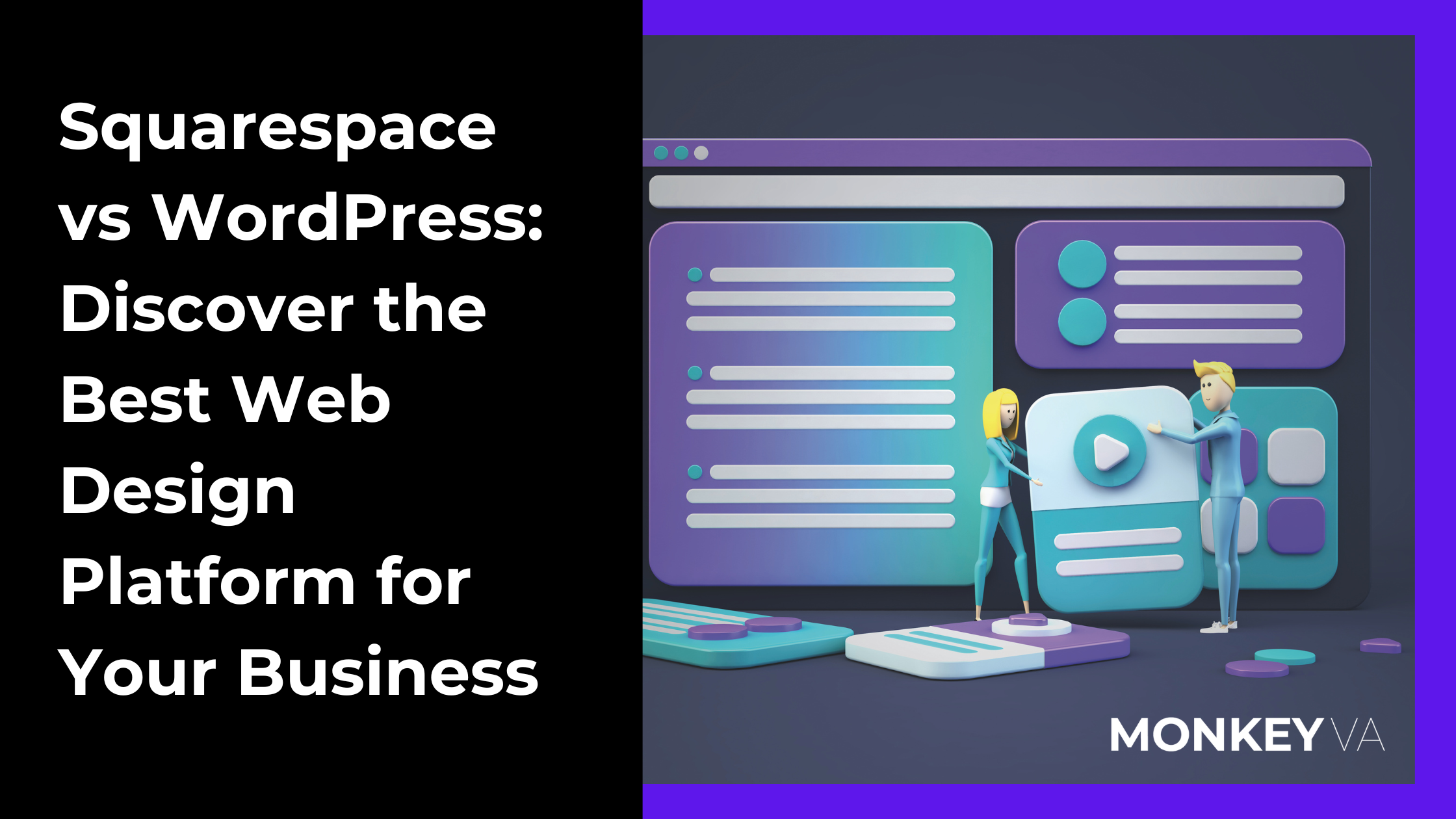Comparing Squarespace vs WordPress comes down to deciding between customization options and immediate access to features.
Disclaimer: Some of the links in this blog post are affiliate links. Monkey VA receives a small commission from certain sales made via affiliate links, but the price is the same for you.
Table of Contents
Every small business in the 21st century needs an attractive, functional website that can tell the story of their brand and act as an effective home base for their marketing efforts.
Creating a website from scratch can feel unapproachable as a non-developer, but numerous platforms exist now to remove these barriers for entrepreneurs, offering user-friendly website building software that doesn’t rely on coding.
Two website creation platforms dominate the market today: Squarespace and WordPress. In this blog, we’ll dive into these two top platforms, covering the pricing, features, scalability, plugins, and SEO functionality for each to help you find the software best suited for your business.
Squarespace vs WordPress: The Basics
Both Squarespace and WordPress are Software-as-a-Service (SaaS) platforms that enable users to build their own websites without any coding knowledge.
Squarespace vs WordPress: Pricing
Squarespace offers monthly and annual subscriptions with four different tiers:
- Personal: $19/ month
- Business: $33/month
- Commerce Basic: $36/month
- Commerce Advanced: $65/month
The personal plan comes with a customized website domain name, SEO features, templates, basic analytics, and access to Squarespace plugins. More expensive plans build on these features with additional marketing analytics, E-commerce functions, third-party integration, and more.
WordPress comes in two different versions: hosted and self-hosted:
Hosted WordPress offers its own hosting, storage, WooCommerce integration, domain name, and premium templates for roughly $15/month, billed annually. There is a free version of hosted WordPress, but it posts advertisements to your website, which doesn’t look great for your business.
Self-hosted WordPress is an open-source piece of content-management software (free to use and modify) that you can use on your own web server. This means that, while the WordPress software is free, you will need to pay for a hosting service with a domain name to use it.
You can host WordPress on shared hosting companies like HostGator, or you can try “managed WordPress” providers exclusively oriented toward WordPress-managed websites like Kinsta. The prices of these platforms can vary depending on the additional features they offer.
Squarespace vs WordPress: Tools
Whichever platform you choose, you will have access to:
- Premade website templates
- Built-in site management tools
- Website analytics
- Plugins for added functionality
However, the platforms diverge in their areas of focus, each offering different capabilities and varying levels of builder engagement. Let’s take a closer look.
Squarespace vs WordPress: Editing Features
Both WordPress and Squarespace are straightforward in terms of editing and publishing content. Both platforms allow you to simply set up webpages, write paragraphs or “blocks” of text, add visuals, and embed links.
The main difference here is that Squarespace offers on-page editing out of the box, whereas standard WordPress is built for backend editing.
On-Page and Backend Editing
In Squarespace, you can navigate to any page on your website, click on a piece of content to edit, and while you are editing, see how it will appear to users visiting your website.
In WordPress, when you navigate to a page from your administrator account, you will be prompted to click “edit” which will direct you to a backend where you will use content “blocks” to format text, pictures, and videos. These edits can only be seen through a preview window and must be manually published before they will save.
The direct-edit format of Squarespace can make it more intuitive for newcomers, but the backend function of WordPress doesn’t take much time to learn either. Plus, with the help of some integrated plugins and tools, you can add on-page editing to WordPress anyway!
Squarespace vs WordPress: Plugins and Added Functionality
Both platforms offer plugins and integrations, but the key difference here is WordPress’s open-source design.
While Squarespace focuses on optional tools and templates for its core features, WordPress offers an extensive marketplace for third-party plugins and integrations. Because it is open-source, programmers are able to continuously adjust their WordPress platforms and make their own plugins to offer features that they find convenient.
This means that, with a little bit of searching and know-how, you can add anything from newsletters to Google Analytics, to added SEO functionality to your WordPress site. Even if WordPress doesn’t offer all the features of Squarespace at its core, chances are you can find essential plugins that offer similar powerful features.
For example: consider the initial lack of on-page editing that was mentioned above. Does that mean with WordPress, you can’t have on-page editing? Not at all! If you install Divi, “the world’s #1 theme and visual page builder”, you can make all your edits on-page with a streamlined, visually-focused editing suite.
So, while Squarespace might offer more ease initially, a growing business has much more to gain from the integration and scalability offered by WordPress plugins.
Squarespace vs WordPress: Search Engine Optimization (SEO)
The basic SquareSpace package comes with integrated Google Analytics for every page on a website. While this beats the offerings of free hosted WordPress, a properly configured self-hosted WordPress platform comes with many more features.
Because self-hosted WordPress is installed on a hosting package of your choice, you can configure your SEO setup specifically for your host. This gives you more control over the technical setup of your website that will ensure it runs smoothly and quickly.
With plugins, you also have access to extended SEO management platforms like Yoast SEO, allowing you to evaluate your SEO for blog posts and learn how to improve your rankings.
Finally, WordPress allows you to add “rich snippets” to your search engine results without any coding. These allow you to include product ratings, prices, and reviews in your text descriptions on search engines. Integrating the same rich snippets on Squarespace requires you to code them yourself.
Squarespace vs WordPress: Site Maintenance
Because Squarespace is self-contained, involving fewer integrations and moving parts, it requires less regular maintenance than WordPress. Most Squarespace maintenance (updates, hosting, managing your server and domain) are handled by Squarespace itself. With a self-hosted WordPress site, you are responsible for all server updates, hosting configurations, and plugin compatibility checks.
Regular WordPress maintenance is essential to maintaining website security and improving your user experience. Missing updates can lead to plugin failure, loss of functionality, or dangerous openings in your website that are susceptible to viruses and security breaches. That is to say maintenance shouldn’t be an afterthought in your decision; it is just as essential as the rest.
Which is Better for Your Business’ Website?
Ultimately, WordPress is capable of doing almost anything that Squarespace can do. Essentially the question is: how much capability does your business website need, and how much time can you invest in setting up and maintaining your website?
Squarespace offers more eCommerce features straight away, as well as its own hosting; on-page editing; and regular maintenance by Squarespace.
Self-hosted WordPress requires you to secure your own hosting through a different provider but allows you nearly unlimited customization and scalability through plugins and integrations. Once you have your hosting set up, it is relatively easy to add the features that you require.
While Squarespace might be better for beginners with a limited team or no prior experience with a business website, WordPress is the better choice for long-term growth.
If Squarespace feels more technologically approachable, but you know WordPress is the best investment for your business, you’re not locked in.



